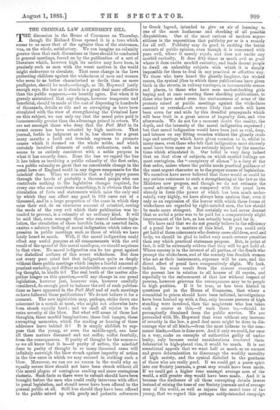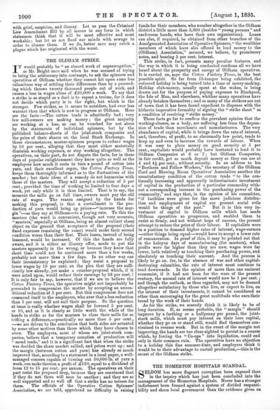THE CRIMINAL LAW AMENDMENT BILL. T HE discussion in the House
of Commons on Thursday, though Sir Richard Cross opened it in a tone which seems to us more that of the agitator than of the statesman, was, on the whole, satisfactory. We can imagine no.cahmity greater than that such discussions as these should be conducted in general meetings, forced on by the publication of a sort of literature which, however high its motive may have been, is precisely such as men with the worst motives in the world might endeavour to circulate. That some change in the laws protecting children against the wickedness of men and women who seem to us better characterised as devils than as mere profligates, should be made,—though, as Mr. Hopwood justly enough says, the law as it stands is a great deal more effective than the public supposes,—we heartily agree. But when it is gravely maintained that any change, however temperate and beneficial, should be made at the cost of dispersing in hundreds of thousands, details so vile and so corrupting as have been circulated with the view of strengthening the Criminal Law on this subject, we can only say that the moral price paid is immeasurably greater than the advantage gained in return. We are not amongst those who deny that the Pall Mall in its recent course has been actuated by high motives. That journal, feeble in judgment as it is, has shown for a great many months a lurid and feverish eagerness to promote causes which it deemed on the whole noble, and which certainly involved elements of noble enthusiasm, such as seems to us entirely consistent with a noble purpose in what it has recently done. None the less we regard the line it has taken as involving a public calamity of the first order, —a public calamity so great that no conceivable change in the penal laws of England could in any degree compensate for the mischief done. When we consider that a daily paper passes through the hands of probably a thousand people who can contribute nothing to the legislative changes required, for every one who can contribute something, it is obvious that the circulation of facts and statements which miss the only end by which they can effect any good in 999 cases out of a thousand, and in a large proportion of the cases in which they miss their end, do an enormous amount of mischief, sowing the seeds of the very evil which their publication was in- tended to prevent, is a calamity of no ordinary kind. It will be said that, even amongst those who cannot influence legis- lation, the circulation of these horrible facts, or asserted facts, excites a salutary feeling of moral indignation which takes ex- pression in public meetings such as those of which we have lately heard so much. Well, if the moral indignation could effect any useful purpose at all commensurate with the evil result of the spread of this moral small-pox, we should acquiesce in that view. No moral indignation can be too great against the diabolical authors of this secret wickedness. But does not every pure mind feel that indignation quite as deeply without these public meetings which inspire a fearful amount of prurient curiosity, and diffuse an intolerable amount of corrupt- ing thought, to kindle it ? The real truth of the matter alto- gether hinges on this question,—will any change in our penal legislation, however just, however wise, however carefully considered, do enough good to balance the evil of such publica- tions as have appeared in the Pall Mall and of such meetings as have followed these publications ? We do not believe it for a moment. The new legislation may, perhaps, strike down one miscreant in a month at most, who might not otherwise have been struck equally hard ; and we shall all rejoice in the extra severity of the blow. But what will come of those hot thoughts, those morbid imaginations, those foul images, those corrupting memories, which the reading or hearing of these addresses leave behind it ? It is simply childish to sup- poets that the young, or even the middle-aged, can hear all these matters discussed and not suffer, suffer fearfully, from the consequences. If purity of thought be the source— as we all know that it is—of purity of action, the mischief done to purity of thought in so many thousand cases will infinitely outweigh the blow struck against impurity of action in the few cases in which we may succeed in striking such a • blow. Moreover, we can see no reason in the world why an equally severe blow should not have been struck without all this moral plague of contagious reading and more contagious rhetoric. Such facts as there were to submit should have been brought before the men who could really intervene with effect in penal legislation, and should never have been offered to the general public at all. Still less should they have been offered to the public mixed up with gaudy and pedantic references to Greek legend, intended to give an air of learning to one of the most loathsome and shocking of all possible disquisitions. One of the most curious of modern super- stitions is the superstition that publicity per se is a remedy for all evil. Publicity may do good in exciting the better currents of public opinion, even though it is concerned with pure evil, where it merely repels, and does not excite any morbid curiosity. It does fifty times as much evil as good where it does excite morbid curiosity, and leads decent people to dwell on unhealthy subjects with which it is simply impossible for them to deal in any practical or effective way. To those who have heard the ghastly laughter, the wicked sneers, the cynical jibes to which these publications have given birth in the streets, in railway carriages, in innumerable scenes and places, to those who have seen modest-looking girls buying and at once secreting these shocking publications, to those who have noted even the unctuousness of some of the protests raised at public meetings against the wickedness asserted or revealed,—it seems likely that seeds will have been sown far and wide by this dreadful propaganda which will bear fruit in a great access of impurity first, and. vice afterwards. We do not for a moment doubt the reality, the depth, and the intensity of the moral indignation expressed ; but that moral indignation would have been just as real, deep, and intense on any fitting occasion without the ghastly read- ings and meetings which have given occasion to it, whilst in many cases, even those who felt that indignation most sincerely must have been more or less seriously injured by the associa- tions which stimulated it. Our belief is very deep indeed that on that class of subjects, on which morbid feelings are most contagions, the "conspiracy of silence" is a duty of the first order, unless where the public needs practical guidance of the most urgent character as to the proper course of legislation. We ourselves have never believed that there would or could be any serious resistance to such a strengthening of the law as the Ministers now propose, and though we do not estimate the moral advantage of it, as compared with the penal laws already in force (the power of which has been much under- rated), very highly, we have always been anxious that, even if only as an expression of the horror with which these forms of wickedness are regarded by right-minded men, the law should be made more stringent. But certainly we had never dreamt that so awful a price was to be paid for a comparatively alight improvement of the law, as has actually been paid for it.
We have said that we do not greatly believe in the efficiency of a penal law in matters of this kind. If you could only get hold of those miscreants who destroy mere children, soul and body, we should be glad to inflict very much severer penalties than any which practical statesmen propose. But, in point of fact, it will be extremely seldom that they will be got hold of. Where secresy is in the interest of all parties, of the fiends who prompt the wickedness, and of the scarcely less fiendish women who act as their instruments, exposure will be rare, and the direct effect of penal laws comparatively slight. We look, indeed, for some result from the sterner execution of the present law in relation to all houses of ill repute, and especially to the enforcement of that law without respect of persons, however grievous the consequences may be to people in high position. If it be true, as has been hinted in questions put in the House of Commons, that where a committal to prison should have been inflicted, investigations have been hushed up with a fine, only because persons of high standing were involved, then the magistrate who has taken such a course as this,—if such there be,—should be peremptorily dismissed from the public service. We are persuaded with Mr. Hopwood that even without any increase of severity in the law, a good deal more might be done to dis- courage vice of all kinds,---from the most hideous to the com- moner kinds,—than is done now. And if only we could, for once in a way, make an example of authorities guilty of undue lenity, only because social considerations rendered them deferential to high-placed vice, it would be much. It is not sensational appeals that we want half as much as an earnest and grave determination to discourage the worldly morality of high society, and the cynical disbelief in the goodness of those who are really good. If we could get a purer spirit into our Society journals, a great step would have been made. If we could get a higher tone amongst average men of the world, a still greater step would have been made.. And it is because the disclosure of all these corrupting details lowess instead of raising the tone of our Society journals and of average men of the world, as well as injures the moral tone of the young, that we regard this perhaps nobly-intended campaign with grief, suspicion, and dismay. Let us patois the Criminal Law Amendment Bill by all means in any form in which statesmen think that it will be most effective and most workable ; but let us not flood our minds with sewage in order to cleanse them. If we do, better men may catch a plague which has originated with the worst.



































 Previous page
Previous page